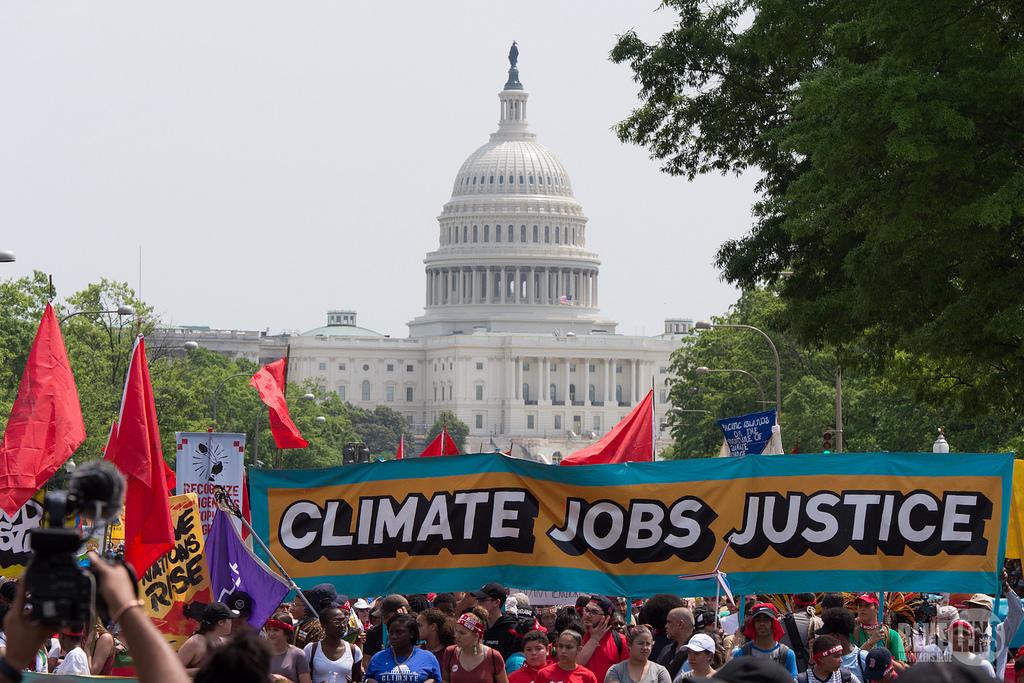Why don’t environmentalists vote?
Protesters march in Washington, DC, at a rally for climate justice in March 2017.
According to the Environmental Voter Project, 20.1 million US registered voters say the environment or climate change is a top issue. But only a small portion of these “super-environmentalist” voters actually turn up at the ballot box to vote. What’s going on?
“The truth is, we don’t know why these environmentalists aren’t voting,” says Nathaniel Stinnett, founder of the project. “We know that people who are likely to really care about the environment are also more likely to be young, African American, or Latino. And those three groups, historically, vote less often than the overall population. But that’s only part of the story.”
The Environmental Voter Project considers someone a “super-environmentalist” if that person is an already-registered voter who lists the environment as either their first or second most important issue.
“The problem is, even though there are 20.1 million who are already registered, they don’t always show up on election day,” Stinnett says. “In 2014, only 4.78 million of those 20 million voters bothered to vote. During the last midterm elections, 44 percent of registered voters showed up to vote, but only 21 percent of environmentalists.”
“What’s really interesting,” he continues, “is when we look just at Latinos, those who care about the environment vote less often than other Latinos. Or if we look just at young people, the people who care about the environment vote less often than other young people. So, there’s something else going on there.”
While Stinnett acknowledges that nobody really knows for sure why these people tend not to vote, he does have a couple of educated guesses.
“Who you vote for is secret, but whether you vote or not is public information,” he says. “So, the first thing any campaign does is look at who votes and who doesn’t. And they only spend their time and money talking to good voters. All these environmentalists who are saying, ‘Politicians don’t care about me’ are absolutely right. If you have a public record of not voting, why on Earth would a politician care about you? So, I think what’s going on here is that politicians make a very clear choice to not spend any time or money talking to, or caring about, people who don’t vote. And environmentalists, by and large, don’t vote.”
There are also demographic correlations, Stinnett says. While the common stereotype of an environmental voter as “a yuppie wearing Patagonia fleeces or hopping out of their Prius in the suburbs was accurate 20 or 30 years ago, it’s not accurate now.”
“Environmentalists are far more likely to be African American, to be Latino, to live within five miles of an urban core, or to make less than $50,000 a year,” Stinnett says. “What this means is that environmentalists are much more likely to have voting barriers thrown up in front of them. I think it’s important that the environmental movement understand that when certain states and certain counties make it harder for minorities or poor people to vote, that disproportionately affects environmental voters.”
While the data is not complete, exit polls indicate that during the 2018 midterms, roughly twice the number of environmentally-focused voters came out to vote as in 2014, Stinnett notes.
Related: The US midterms ‘blue wave’ has mixed results for the environment
“It’s not apples-to-apples,” he says, “but clearly the data shows that something is changing. Either more of our existing environmentalists turned out to vote, or there are some existing voters whose priorities are changing. Maybe they didn’t care about the environment two years ago or four years ago, but now they care about it a lot more.”
Stinnett predicts these numbers will rise again during the 2020 election year, especially during the Democratic presidential primary.
Related: Here’s why many young voters see climate change as THE issue in 2016
“Climate voters and environmental voters are going to be an enormous constituency,” he says. “I would go so far as to say that maybe 20 percent of the people who vote in the Democratic presidential primary could end up listing climate and the environment as either their number one or number two issue. This is an enormous constituency that could be mobilized if someone focused their messaging on climate change.”
This article is based on an interview that aired on PRI’s Living on Earth with Steve Curwood.
